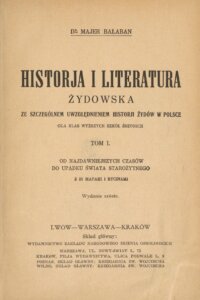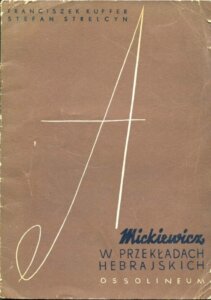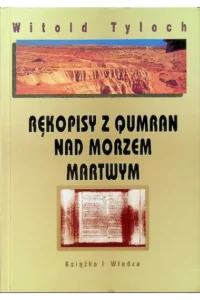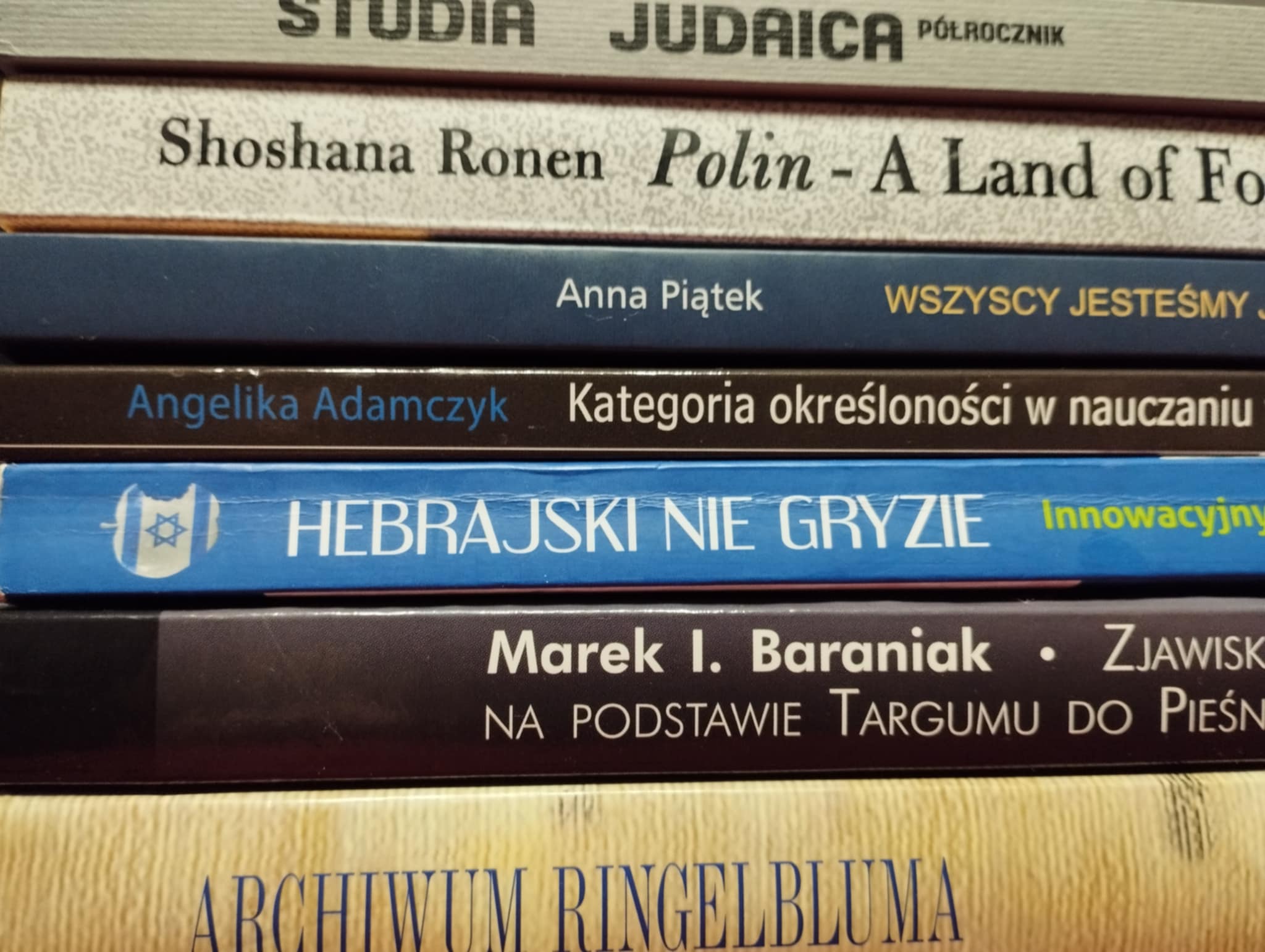History of the Department
The study of Hebrew at the University of Warsaw boasts a rich and multifaceted history, deeply intertwined with the evolving academic and cultural landscape of the institution and beyond. Over the decades, scholars and researchers have explored a wide array of topics, ranging from the linguistic intricacies of the Biblical Hebrew to the vast expanse of Hebrew literature, religion, and cultural heritage. This dynamic field has been shaped by diverse methodologies, including philological, historical, and socio-cultural approaches, reflecting broader shifts in the academic study of Jewish and Hebrew traditions.
Mid-War Period. Focus on Biblical Philology
 After World War I, Hebrew was studied at the University of Warsaw as the language of the Bible, which resulted in the specialization of Biblical Philology emerging in three separate faculties. At the Faculty of Catholic Theology, classes in Hebrew and Aramaic were taught by Rev. Prof. Jan Stawarczyk, head of the Biblical Philology Seminar; other Semitic and Old Eastern languages were taught by Rev. Prof. Jozef Bromski, head of the Semitic Languages Seminar. When the Institute of Oriental Studies was established at the University in 1932, the curriculum informed each year about the possibility of learning the aforementioned languages from Rev. Prof. J. Bromski. In the Faculty of Evangelical Theology, Hebrew was taught by Rev. Prof. Jan Szeruda, an excellent translator of the Old Testament books. After the faculty was dissolved in 1954, he taught at the Academy of Christian Theology. Among other things, he researched the Qumran Caves Scrolls; he died in 1963. At the School of Orthodox Theology, Hebrew was taught by Associate Professor Sergey Kisiel-Kisielewski. When writing about Hebrew scholars of this period, one cannot omit Prof. Majer Balaban of the Faculty of Humanities at the University of Warsaw, an outstanding expert in Jewish history and culture.
After World War I, Hebrew was studied at the University of Warsaw as the language of the Bible, which resulted in the specialization of Biblical Philology emerging in three separate faculties. At the Faculty of Catholic Theology, classes in Hebrew and Aramaic were taught by Rev. Prof. Jan Stawarczyk, head of the Biblical Philology Seminar; other Semitic and Old Eastern languages were taught by Rev. Prof. Jozef Bromski, head of the Semitic Languages Seminar. When the Institute of Oriental Studies was established at the University in 1932, the curriculum informed each year about the possibility of learning the aforementioned languages from Rev. Prof. J. Bromski. In the Faculty of Evangelical Theology, Hebrew was taught by Rev. Prof. Jan Szeruda, an excellent translator of the Old Testament books. After the faculty was dissolved in 1954, he taught at the Academy of Christian Theology. Among other things, he researched the Qumran Caves Scrolls; he died in 1963. At the School of Orthodox Theology, Hebrew was taught by Associate Professor Sergey Kisiel-Kisielewski. When writing about Hebrew scholars of this period, one cannot omit Prof. Majer Balaban of the Faculty of Humanities at the University of Warsaw, an outstanding expert in Jewish history and culture.
Post-1945. From Biblical Hebrew to Modern Hebrew
 The post-war history of Hebrew Studies at the University of Warsaw is linked to the names of Semitists for whom Hebrew was one of the fields of interest. Hebrew instruction did not begin at the University’s Institute of Oriental Studies until after World War II, starting in 1950 in the Chair of Semitic Studies headed by Prof. Stefan Strelcyn. While the topic of lectures there was Biblical Hebrew, since 1959 a Hebrew seminar was operating, with lectures on the history of Israel and Hebrew literature. Modern Hebrew language became a subject of interest over time. Stefan Strelcyn published a book together with F. Kupfer, Mickiewicz in Hebrew translations (Wroclaw 1959). Modern Hebrew was also studied by Wladyslaw Tubielewicz, the first lecturer of this language at the Institute of Oriental Studies (he worked there until 1962, and then from 1990 to 1995). He is also the author of the article Vom Einfluss europäischer Sprachen auf die Gestaltung des modernen Hebräisch, one of the first scholarly publications on modern Hebrew in postwar Poland.
The post-war history of Hebrew Studies at the University of Warsaw is linked to the names of Semitists for whom Hebrew was one of the fields of interest. Hebrew instruction did not begin at the University’s Institute of Oriental Studies until after World War II, starting in 1950 in the Chair of Semitic Studies headed by Prof. Stefan Strelcyn. While the topic of lectures there was Biblical Hebrew, since 1959 a Hebrew seminar was operating, with lectures on the history of Israel and Hebrew literature. Modern Hebrew language became a subject of interest over time. Stefan Strelcyn published a book together with F. Kupfer, Mickiewicz in Hebrew translations (Wroclaw 1959). Modern Hebrew was also studied by Wladyslaw Tubielewicz, the first lecturer of this language at the Institute of Oriental Studies (he worked there until 1962, and then from 1990 to 1995). He is also the author of the article Vom Einfluss europäischer Sprachen auf die Gestaltung des modernen Hebräisch, one of the first scholarly publications on modern Hebrew in postwar Poland.
The names of units and sections changed later several times: in 1968 the Chair of Semitic Studies was renamed the Department of Semitic Studies, and in 1969 – to the Department of Semitic and African Studies, headed by Prof. Witold Tyloch. In 1969, Prof. Strelcyn left Poland. He first worked at the School of Oriental and African Studies in London, and later became a professor at the University of Manchester; he was also honored with membership in the British Academy. Beginning in 1975, the Hebrew Studies section belonged to the newly established Department of Near Eastern and African Studies. In 1977, this department split into two units, and the Middle East and Maghreb Department was created. After its disintegration in 1979, the section of Hebrew Studies became part of the Department of Ancient East and Hebrew Studies, headed by Prof. Tyloch until his death in 1990.
Hebrew Studies under Prof. Witold Tyloch
 Didactics and academic research in the field of Hebrew Studies were indeed developed by Prof. Witold Tyloch. His curriculum included Hebrew language classes and propaedeutic lectures on the history of Hebrew literature, the history of the Jews and ancient Israel, and the history of Judaism with an outline of its doctrine and liturgy. Learning Hebrew consisted of mastering biblical Hebrew and the biblical text, in accordance with the assumption that the grammatical structure of Hebrew should be presented on the basis of the ancient literary standard, namely biblical Hebrew.
Didactics and academic research in the field of Hebrew Studies were indeed developed by Prof. Witold Tyloch. His curriculum included Hebrew language classes and propaedeutic lectures on the history of Hebrew literature, the history of the Jews and ancient Israel, and the history of Judaism with an outline of its doctrine and liturgy. Learning Hebrew consisted of mastering biblical Hebrew and the biblical text, in accordance with the assumption that the grammatical structure of Hebrew should be presented on the basis of the ancient literary standard, namely biblical Hebrew.
Professor Tyloch’s main fields of research were history, literary studies and religious studies. In particular, he was engaged in the most dynamic field within Hebrew Studies of the last century, namely the Qumran Studies. The texts discovered at Qumran formed the basis of his habilitation thesis Social Aspects of the Qumran Community in the Light of Dead Sea Manuscripts and Texts of Ancient Authors (Warsaw, 1968). He was also interested in another great Semitic Studies finding, namely the Ugaritic texts found in Syrian Ugarit (Ras Shamra). He published the results of his studies in this area in a comparative treatise Discoveries at Ugarit and the Old Testament (Warsaw 1980). A type of summary of Prof. Tyloch’s biblical interests was the book The History of the Books of the Old Testament. Sketches from Biblical Criticism (Warsaw 1981). His publications in the field of religious studies should be mentioned as well, especially his work Judaism, devoted to the history of this religion and, although to a lesser extent, its religious doctrine, which was published in 1987 as part of the “Religions of the World” series. In addition, Witold Tyloch pursued a plan to publish a Polish translation of the Mishnah, one of Judaism’s most important texts. Work related to this topic was the subject of a master’s seminar.
Prof. Tyloch’s academic interests also included linguistics. The lecture he gave for many years yielded the monograph Hebrew Language Grammar (Warsaw, 1980). His works in this field also include the article The evidence of the proto-lexicon for the cultural backgound of the Semitic people. In 1972-1977, after graduation, Witold Witakowski worked as an assistant in the Department of Semitic and African Studies. He taught several subjects, including Hebrew. He later became a professor at Uppsala Universitet. He published many valuable works on Syrology and Ethiopian Studies, as well as Hebrew Studies.
In 1973, Ewa Świderska took a job in the Department of Semitic and African Studies. She specialized in modern Hebrew; she studied both modern Hebrew literature (e.g., Shmuel Yosef Agnon) and Slavic influences in modern Hebrew. This second line of research followed in the tradition represented by the works of Moshe Altbauer and Wladyslaw Tubielewicz. Hebrew Studies at the University of Warsaw were also completed by Piotr Muchowski, an expert in Qumran Studies, creator and head of the Department of Hebrew, Arameic, and Karaim Studies at the Adam Mickiewicz University in Poznań.
The Department of Hebrew Studies (1990)
 After Witold Tyloch’s death in 1990, the Department of Ancient East, Egyptology and Hebraic Studies broke up into smaller units, and so the Department of Hebrew Studies was created. Initially, the position of its curator was held by Prof. Bohdan Składanek, then director of the Institute of Oriental Studies. In 1993, Roman Marcinkowski received his doctorate and became head of the department. He held this position until 2001. From 2001 to 2008, the position of head was held by Dr. Maciej Tomal, from 2009 to 2021 by Prof. Shoshana Ronen, and since 2021 the Department has been headed by Dr. Angelika Adamczyk.
After Witold Tyloch’s death in 1990, the Department of Ancient East, Egyptology and Hebraic Studies broke up into smaller units, and so the Department of Hebrew Studies was created. Initially, the position of its curator was held by Prof. Bohdan Składanek, then director of the Institute of Oriental Studies. In 1993, Roman Marcinkowski received his doctorate and became head of the department. He held this position until 2001. From 2001 to 2008, the position of head was held by Dr. Maciej Tomal, from 2009 to 2021 by Prof. Shoshana Ronen, and since 2021 the Department has been headed by Dr. Angelika Adamczyk.
Nowadays, the basis of Hebrew grammar instruction is modern (Israeli) Hebrew, so the assumption that has hitherto been the starting point in teaching Hebrew grammar has changed profoundly. Modern Hebrew is a rich object of study due to its unique blend of ancient linguistic roots with contemporary influences, making it a fascinating example of language revival. Its evolution offers insights into the intersection of culture, history, and politics, as it transitioned from a liturgical language to a vibrant, everyday medium. Additionally, its dynamic vocabulary, shaped by globalization and technological advancements, provides a compelling case for examining the adaptability of languages in the modern era.
Current students of the Department begin by studying modern Hebrew as it is used today, before moving on to explore its earlier stages of development. In the current curriculum, the study of modern Hebrew occupies the most important place, being the starting point for further work in subjects such as as Israeli and Jewish history, Hebrew literature or epigraphy, socio-cultural issues of modern Israel, Hebrew translation and other specialization classes. On the MA level, students have the opportunity to attend advanced seminars and monographic lectures in fields such as literary studies, philosophy, cultural studies and linguistics.
Department’s teaching staff is frequently awarded by the University authorities for their contribution to innovative teaching methods and teaching excellence. The team cooperates closely in the teaching of Hebrew, actively seeking methods and ways to make its acquisition by students as effective as possible by participating (also actively) in numerous conferences and workshops for teachers of Hebrew as a foreign language, as well as creating a European community for Hebrew instructors.
